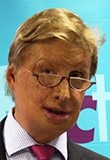 Today, 26th May 2017, is Face Equality Day—the first in the UK. People all over the country will be wearing the unique butterfly that is the Changing Faces logo on their faces.
Today, 26th May 2017, is Face Equality Day—the first in the UK. People all over the country will be wearing the unique butterfly that is the Changing Faces logo on their faces.
Over the past 25 years, Changing Faces has received far too many reports—borne out by research—that people with disfigurements to their face or body are disadvantaged. In 2008, we launched a campaign for face equality which showed that nine out of 10 people in the UK found it very difficult to associate positive characteristics to someone with an unusual-looking face—believing them less likely to be successful, fun to be with, or happy.
Since 2008, we have endeavoured to raise awareness of the prejudice and discrimination associated with disfigurement—and we have made some progress—the number of people showing bias is now down to seven out of ten.
But we also know that we need much more evidence to really tell the story.
Today, Changing Faces publishes Disfigurement in the UK, which shows categorically, and in stark terms, that if you have a condition, mark, or scar that affects your appearance, you are likely to face widespread discrimination, multiple challenges, and often abuse and harassment from other people. The report is based on a 200-question survey completed by over 800 people.
More than a million people in the UK have a disfigurement. They may have been born with a condition like Treacher Collins Syndrome, a birthmark, or a cleft lip and palate, or may have acquired a condition like a Bell’s palsy, or been left with burn scars or an asymmetrical face following surgery for cancer or another disease. Or they may have psoriasis, acne, vitiligo, or another skin condition.
Whatever the cause of their disfigurements, respondents to our survey told us that at school, at work, in the street, in a shop or a restaurant, when they’re trying to find love, or use public transport, trying to report a crime and—disturbingly—when they’re using the NHS, their lives can be made much more difficult by the attitudes of others.
More surprisingly, more than 75% of respondents reported experiencing a healthcare professional making assumptions about them based on their appearance in delivering healthcare to them. And 67% have had one making an assumption about their emotional health based on their appearance. Three quarters also report being denied medical or surgical treatment because a healthcare professional regarded it as “cosmetic” or unnecessary.
These are very unexpected and uncomfortable findings for us at Changing Faces. We have long worked with healthcare professionals from many specialties across the UK who work tirelessly to provide the best care for patients and as such, we had believed that all healthcare professionals held much more enlightened views and attitudes about people with disfigurements—in contrast to the biases that are widely acknowledged in the commercial and media sectors.
We had assumed that it was therefore unnecessary for us, and even presumptuous, to conduct “face equality training” in the NHS—an activity which we have been asked and paid to provide in many corporate settings since the campaign for face equality was launched in 2008. However, as we know from our new Implicit Attitudes Test, everyone is liable to show and be vulnerable to unconscious bias and this, it appears, includes staff in the NHS.
We therefore propose to adapt our current face equality training—which enables people to appreciate their implicit biases towards disadvantaged, minority, and stigmatised groups—for healthcare professionals.
I would therefore be glad to hear from anyone who will commit to addressing these biases, however unwitting—and would like to trial such training in their clinical setting—which could be in primary care or in any the specialties dealing with disfiguring conditions—plastic surgery, maxillo-facial surgery, neurology, dermatology, oncology.
James Partridge OBE is founder and chief executive of Changing Faces, the leading UK charity supporting and representing people with disfigurements (www.changingfaces.org.uk). He is also founding director of Dining with a Difference, a disability consultancy company.
james.partridge@changingfaces.org.uk
Competing interests: None declared.
